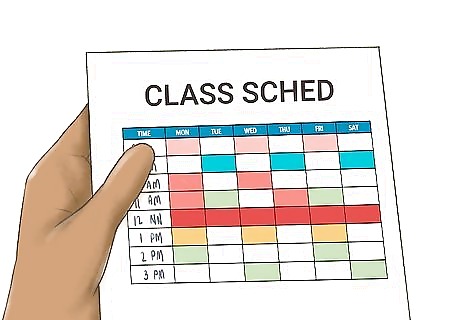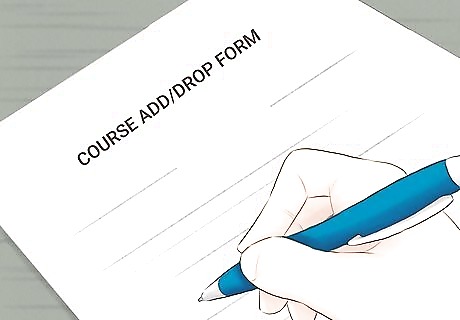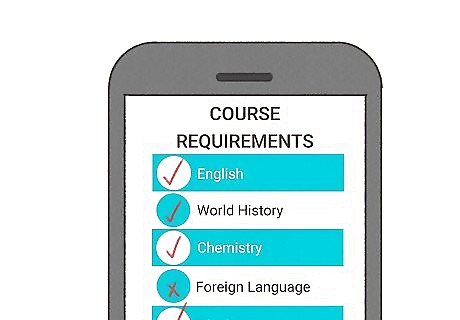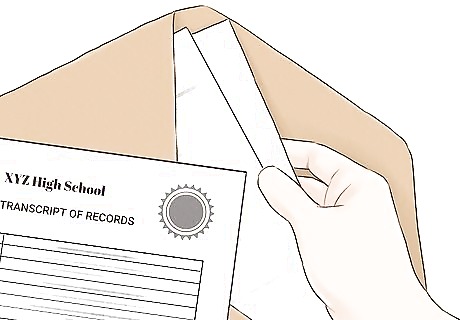
views
How to Change Classes

Talk to your guidance counselor. The minute you start thinking about changing classes, head to your guidance counselor’s office. Not every class can be changed because of high school graduation requirements or policies. Your guidance counselor will know what you can and can’t do and help guide you toward the best solution. Consider asking your counselor some of these questions: What classes are required for me to graduate? What do I have to do to switch classes? Are there any other classes that fit my schedule and school requirements? Is there another class I can take that’ll challenge me? What classes look good on college applications?

Find new classes that fit your schedule. When talking with your guidance counselor, ask for a list of available classes you can take. Focus on what's needed to meet your required credits and notice what fits into your current schedule. The fewer classes you have to change, the better. Consider talking to multiple teachers, including the teacher of the class you want to drop. They can help guide you toward a class level you’ll feel the most comfortable or challenged in. When picking classes, don’t forget to consider what colleges are looking for. Research if there are any prerequisites you need before applying.

Fill out any necessary add/drop paperwork. Your school may require you to fill out a form before changing classes. If this is the case, your guidance counselor should be able to provide you with the forms and information you need. A parent or guardian’s signature may also be required to approve your class change. Many high schools now offer add/drop paperwork virtually. Keep a copy of all your class change documents as these could save you from a transcript mix-up in the future.
Things to Consider Before Changing Classes

Why do you want to change classes? Before switching up your schedule, it’s important to ask yourself why you want a change. Taking some time to reflect on your reasons before deciding can help you vocalize your concerns to your guidance counselor. Check out these leading reasons high schoolers change classes: Difficulty level: The class is either too easy or too hard. Problematic teacher: The teacher’s teaching style conflicts with your learning style. Wrong class: The class won’t count towards your diploma credits or transfer to a preferred college.

How far into the school year are you? Generally, it’s harder to change classes once the school year or semester has started. Most schools have a grace period during the first week of classes where students can make changes with a guidance counselor’s permission. However, it’s always best to try and switch around your class schedule before the semester starts. Talk to friends when you get your schedule to get an idea about the class’s difficulty level and teacher’s teaching style. Check your class schedule and transcript to see if your classes match your school’s requirements.

What classes do you need to graduate? Meeting your high school’s requirements is absolutely necessary to receive your diploma on time. Ask your guidance counselor for a list of required credits or classes and your transcript. This will give you an idea of what requirements you’ve already met and what still needs to be met, helping you choose the right courses.

Will your transcript stand out to colleges? Colleges look for many things in an applicant, but they often look for students who challenge themselves. Admissions boards see thousands of applications a day, so think about how you can make your transcript shine. Changing classes could be an opportunity to excel now and in the future. Colleges often look for students with stellar grades, high-level courses, and extracurricular activities.

Is your schedule balanced? You may need to change classes because you're missing a required class or in the wrong skill level. It’s typical for high schoolers to take courses in English, science, math, social studies, and foreign language each year. On top of this, it’s also important to consider whether or not you’re taking classes you enjoy and that challenge you.
What to Do If You Can’t Change Classes

Do your best. Sometimes, all you can do is take a deep breath and stick it out. This may be your best bet if you’re too far along in the school year or need to take the class to finish your transcript and fulfill high school requirements. Study hard and keep moving forward—you got this!

Find a tutor. If you can’t get out of a difficult class, consider seeing a tutor every week or so. Academic tutoring has been proven to increase student performance and help improve study habits, so what do you have to lose? Ask your guidance counselor or teachers if your school has a tutoring program, or set up a study group with friends after school where you can all help each other. There are hundreds of online tutoring programs that can help! GoPeer, Varsity Tutors, Chegg, Club Z, and Khan Academy, just to name a few.

Consider an online class. This may be an excellent option for you if you want to change classes, but your school doesn’t offer an alternative. Ask your guidance counselor about online and dual enrollment opportunities. You may be able to enroll in a virtual course that gives you high school credits that also challenges you on a college level.














Comments
0 comment